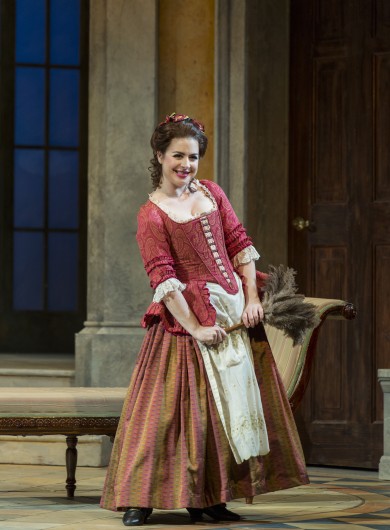Despite a lack of vocal gleam, Sarasota Opera’s “Cosi” does Mozart right
Sarasota Opera’s current production of Mozart’s Cosi fan tutte is not exactly a gleaming vocal showcase, with too much of the singing missing the kind of refinement and polish that should be a prerequisite for any successful Mozart production.
Yet even with the uneven vocalism at Friday night’s performance, Sarasota’s engaging production got so much right in a notoriously difficult opera to pull off that it made one more forgiving of the less-than-stellar singing.
Lorenzo da Ponte’s libretto tells of two soldiers, Ferrando and Guglielmo, who, on a dare from the old cynic Don Alfonso, wager that their fiancees, the sisters Fiordiligi and Dorabella, will remain faithful to them no matter what. With the aid of the sisters’ sly maid Despina, the men return disguised as “Albanians” and proceed to woo each other’s beloved, with unexpectedly successful results.
Mozart’s comedy has gotten a lot of stick over the last two centuries. Beethoven viewed it as immoral, though the mate-swapping device seems either forward-looking or quaintly retro depending on one’s perspective. More recently the work has been a target of feminists and assorted academics who find it demeaning to women, though such critics make the solipsistic error of viewing historical works through a contemporary lens (and, often, a highly personal and political one). The women, in fact, come off much better than all the men in the piece.
Scenario apart, Cosi contains some of Mozart’s most glorious music, with a superabundance of duets, trios, quartets and more mixed ensembles than any other major Mozart opera.
Corey Crider showed his bona fides as a wonderful comic presence in Sarasota’s production of Verdi’s Un giorno di regno three seasons ago. As Guglielmo, the baritone was simply terrific—vividly characterful, singing with a robust voice (well earning his extra aria) and making the comedy pay off at every opportunity, with the boys’ romantic masquerade genuinely funny.
As Ferrando, Heath Huberg was a fine partner for Crider, the two men making a simpatico comic duo yet still making their anger at the game’s unwonted results come across as well. Unfortunately, the tenor’s dry, raw-toned voice displayed little finesse or refinement, with Huberg’s blandly delivered “Un aura amorosa” jarring in its lack of feeling and expressive poise.
Jennifer Townshend as Fiordiligi also had vocal issues, her shallow soprano wanting in agility on top as well as ballast below; the lack of chest voice was manifest in an effortful “Come scoglio.” Still, she acted well and sang sensitively throughout. Townshend’s “Per Pieta,” was the vocal highlight of the evening, sung with poise and depth of expression.
With Shirin Eskandani, the company’s Dorabella, under the weather, the cover, Kathleen Shelton, took the stage Friday night. The young mezzo seemed nervous at first but appeared to grow in confidence as the evening proceeded, a memory lapse in “È amore un ladroncello” apart. Vocally her tone is anodyne and her technique lacks seasoning, but Shelton sang solidly and entered into the proceedings with game commitment.
Stefano de Peppo lacked some bass heft for Don Alfonso, but was a worthy presence as the wily reprobate.
The best overall performance, along with Crider, was that of soprano Angela Mortellaro as Despina. The energetic Milwaukee native owned the stage whenever she was on it–fully believable as the spunky maid, hilarious in her disguises, and singing with precision and refined Mozartian style.
The elegant traditional production is one of Sarasota Opera’s best, with fluid scene changes and elegant costumes, by the company’s favorite triumvirate of David P. Gordon (scenic design), Howard Tsvi Kaplan (costumes), and Ken Yunker (lighting). Marcello Cormio was an assured hand in the pit, conducting the score with vitality while leaving the singers room to breathe in their solos.
Director Kathleen Smith Belcher made a very impressive company debut, with staging that was faithful to the libretto, blocking skilfully and keeping the high-jinx from going over the top. She also handled the problematic finale with understated deftness by having the women pair off with their new lovers–who they really were more attracted to–in a fashion that felt just right and avoided heavy-handed revisionism.
Cosi fan tutte runs through March 12. sarasotaopera.org
Posted in Performances
Leave a Comment
Sat Feb 27, 2016
at 3:41 pm
No Comments






